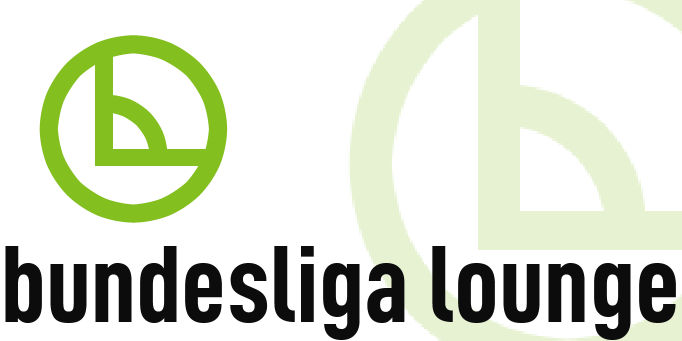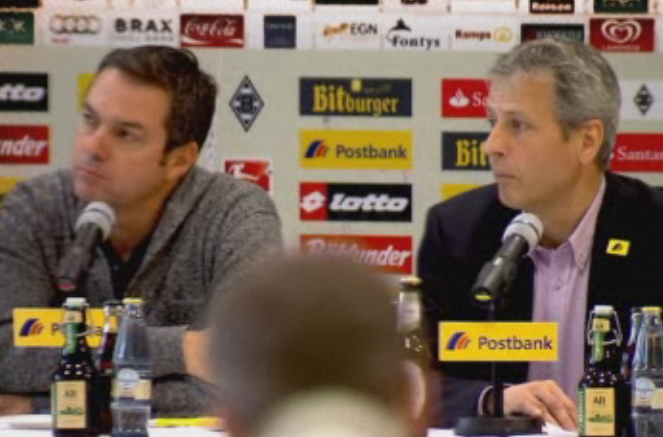One year to bring the golden days back to ‘Gladbach

 Borussia Mönchengladbach’s rise to the upper echelons of the German top flight has been so sudden that you want to soak up as much of it as possible lest they fall back to where they were just over a year ago at the bottom of the Bundesliga. But as their coach, Lucien Favre approaches his first anniversary in post, is this sudden success sustainable asks Terry Duffelen.
Borussia Mönchengladbach’s rise to the upper echelons of the German top flight has been so sudden that you want to soak up as much of it as possible lest they fall back to where they were just over a year ago at the bottom of the Bundesliga. But as their coach, Lucien Favre approaches his first anniversary in post, is this sudden success sustainable asks Terry Duffelen.“Last season is like a bygone era.” said Borussia Mönchengladbach Sporting Director Max Eberl on DW Sport “We were bottom of the table and we took a lot of grief for that and so did the fans.” It would have been more than interesting to be a fly on the wail of Ebert’s office when Lucien Favre was offered the coach’s job at Borussia Park. Was the job sold to him or did the former Hertha coach do the selling? Did he tell his prospective boss that one year from now he’d be pushing for a Champions League qualification place? Unlikely.
Yet there they are, one year later, fourth place in the Bundesliga and in the Semi-Final of the German Cup. After a last ditch relegation play off in May and an attempt in the Summer from former player Stefan Effenberg to depose Eberl, both he and Favre have engineered an extraordinary turnaround for a club that may have had some bookies paying out on their relegation as early as the Winter Break, last season.
Since taking over, Favre’s team have conceded only 21 goals in the Bundesliga. Marco Reus has realised his potential and become the talk of the Bundesliga. Patrick Hermann has proved that ‘Gladbach does not have a one man attack and that perennial underacheiver Mike Hanke is a player transformed since his transfer from Hannover 96. At the back, Marc Andre Ter Stegen, the 19 year old who, according to his captain Filip Daems, has the “charisma of a 30 year old” is arguably the in form goalkeeper in the Bundesliga and has given renewed confidence to the regular back line of Filip Daems, Dante, Martin Stranzl and the excellent Tony Jantschke.
However, probably one of the more compelling of the ‘Gladbach narratives is whether their success can be sustained not just until the end of this season but for campaigns yet to come. Is this the beginning of another golden age at Mönchengaldbach?
A foundation stone for their building blocks has to be the coach, Lucien Favre. But this is more that just a question of whether he will stay or move on to another challenge but if he does remain, will he be properly resourced? Irrespective of where ‘Gladbach finish in May, the squad is set to lose both Reus to Borussia Dortmund and the influential midfielder, Roman Neustadter who’s contract expires at the end of the season and has agreed to join Schalke. While these players may not to be immediately replaceable, it will be necessary bring in players to succeed them.
When Favre took Hertha Berlin to fifth place in the Bundesliga in 2009, he lost a some influential players at the end of that season (most notably the imposing Ukraniain forward, Andriy Voronin) and was unable to replenish his squad. After a poor start to the following campaign, Favre was dismissed. This is a fact that will surely not be lost on him in the Summer as he thinks about the next season. To avoid history repeating itself, the ‘Gladbach’s squad needs to grow. Presumably a portion of the transfer fee of €17.5 for Reus will be available. That sort of money can go along way if spent wisely. However, if Favre can get his team into a Champions League spot and subsequently into the group stages then the possibility exists to not just fill the gaps in the squad but to move it forward to such an extent where a second consecutive top four finish may be a realistic ambition.
But there are of course so many variables involved in that particular equation. For one, while ‘Gladbach may be able to raise plenty of money from Champions League football, there is the club’s wage structure to consider. While the Borussia Park regularly sells out, the club is by far from the richest in the Bundesliga and will have a wage structure in line with their turnover. Being able to afford the transfer fee for top players is pointless if they are not in a position to meet their wage demands.This raises the further possibility that their remaining players become the subject of transfer bids. Even if they could offer the player’s Champions League football, would ‘Gladbach be in a poisition to fend off Bayern Munich if they came calling for Tony Jantschke or Patrick Hermann?
And then of course there is the small matter of actually finishing this season in the top four in the first place. Failure to achieve this will render all other permutations moot. In 2009 Favre’s Hertha looked in a strong position to finish in the top three and perhaps even win the title. Instead they finished fifth which although impressive, could have been so much more and indeed, Hertha were relegated the following season. If ‘Gladbach don’t make it to the big show, next season, could the same fate befall them?
The good news is that all will be revealed over the next few crucial months of this season and the early week’s of next season. The mission is straightforward: If Favre can keep his squad onside and be given sufficient funds to bring in replacement bodies while keeping hold of his top young players plus qualifying and securing a place in the Group stages of the Champions League then maybe this is the start of a new golden age for ‘Gladbach. That’s a lot of plates to keep spinning at the same time but there is a healthy gap between themselves and fifth placed Bayer Leverkusen. It is entirely likely that one year hence, Lucien Favre will be celebrating a second year as coach of Borussia Mönchengladbach. That alone would be some feat.


 Apple podcasts
Apple podcasts Google podcasts
Google podcasts Spotify
Spotify TuneIn
TuneIn RSS feed
RSS feed Instagram
Instagram Blue Sky
Blue Sky